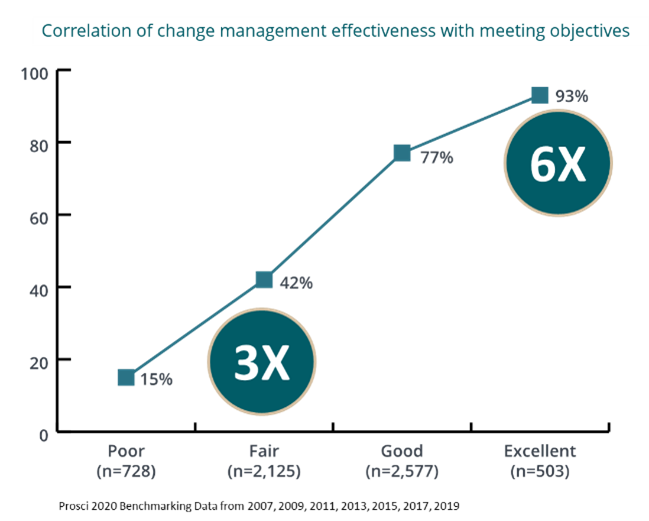Webinar round-up: Building Change Capability from Within
Far too often, change management isn’t embedded into organisations and the way they operate. Agile Change expert Melanie Franklin predicted that, in 2022, businesses would be looking to add change professionals to teams as well as identifying who already has the capabilities internally – listen to the full conversation here. By internalising change, businesses give themselves the best chance of project success and change adoption.
Helping us break this down in our latest digital roundtable was James Bootle, Business Change Manager at Hotel Chocolat. James has worked in the change and project space for 13 years and made the move into retail transformation 6 years ago. James has helped to build the change capability within Hotel Chocolat’s transformation team to enable the next step in its growth journey, so he’s well poised to tackle this topic.
What is internal change capability?
Companies regularly want to update their business model or internal processes to stay relevant. Historically, they may have brought in external contractors to run a change project, but the value of dedicated internal change managers is becoming ever clearer as time goes on. Employees may be moved over into change-specific roles, but it’s not that simple.
The entire company must adopt a change-oriented mindset and strong change leaders and managers are needed to carry this forward long-term. Otherwise, the idea that change is a constant won’t permeate the business and change will struggle to stick.
What is the value of internal change capability?
Understanding of the culture of the business
Orienting the business to embrace the concept of change on a consistent basis rather than only project-by-project will help to normalise it. Instead of becoming flustered when a project launches, employees will be used to the concept of change, generating less stress in the process. In practice, this can accelerate the leadup time before mobilising a project because everyone is on the same page. It also ensures that there is a wider awareness of change and common language around it that is understood by all.

Existing relationships and networks
Compared to external contractors, change managers that are embedded into the organisation will garner much more trust. They’ll naturally have stronger relationships with employees, which is key in driving people change. Internal managers make for better sponsors because they have more authority, they’re more visible, and people will listen to them more. It also helps if sponsors are actively invested in the change – if, for example, it directly affects their business area, they’re much more likely to be an active advocate.
Deeper knowledge of systems and processes
Change managers that are outside of the business will run assessments to get an understanding of the challenges of the business, but that only goes so far. Internal change capability brings an innate knowledge of how the business operates. So, leaders will know how best to communicate effectively, and how to engage the business across multiple channels. Change projects often run across multiple business areas, and someone internal will have a better chance of success.
The importance of strong change management
We’re all aware of the importance of good change management but communicating that to senior leaders can be a challenge. If you’re trying to advocate for change management and internal change management recruitment, the following research by Prosci could help. To people who work in change, this graph illustrates what we all know about the importance of change management.

The Prosci study asked people how they rated their organisations’ change management and if the initiative met their objectives. They found that projects that had fair change management – which is still far from ideal – were 3 times more likely to meet objectives. Excellent change management – what we should all be striving for – led to 6 times the likelihood of meeting objectives. The incentive to invest in strong change management is clear. Businesses can’t afford to waste the amount of time, money, and effort that go into projects and programmes, especially when it’s avoidable. Building change capability from within will increase the chances of great change management and therefore project success.
Challenges of relying on internal change capability
Resistance to change
Bringing change management internally isn’t always a smooth process. Many people in different teams will never have experienced internal change leadership and might not be receptive to it. Getting teams over this hurdle may require supplementing your internal change teams with interim support. That way, they can get used to the new methods while still having external change managers that they’re more familiar with.
Limited experience of change leads
In some cases, teams may have never experienced change management at all. The only way to combat this is to have strong change leadership from someone who is experienced. It will also help if a standard methodology and toolkit are used so that results can be delivered consistently. Once employees see the benefits of change, they’ll be more likely to get on board.
Internal politics
Since change programmes often affect multiple business areas and different teams with different views, it can be difficult to navigate internal politics. You need to ensure that sponsorship and buy-in is coming from the senior level. Someone senior with authority needs to be visibly advocating for the change, because they’ll be able to bridge the gaps between divisions. Communicating the value of change to each team is crucial so that the management then advocates for it within their team, and that’s most easily done by a senior person.
This was a really interactive conversation and a great way for industry peers to discuss ideas and insights on how to improve their change strategies. A huge thank you to those who joined us.
If you would like to sign up to attend future business transformation and change webinars, sign up on our Networking Events page.
Deltra Group is only on the other end of the phone if you need help finding your next change management job or hire. Get in touch today on 0207 375 9500.

Helen Ives
25th April
Events
Related insight
Related News
Looking to
transform?
Quicklinks

Address
Deltra Group
52-54 Gracechurch St
London
EC3V 0EH
Contact
+44 (0)207 375 9500
info@deltragroup.com



